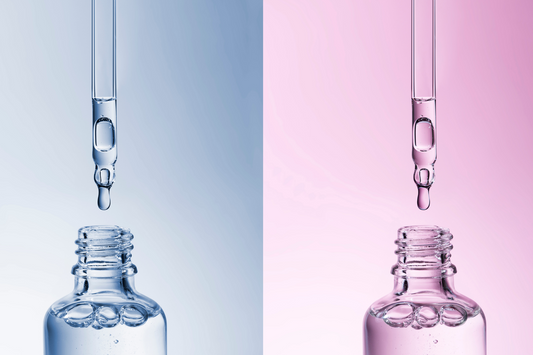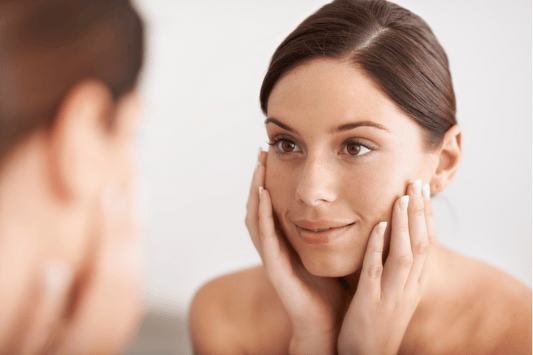For many, hair loss is an inevitable fact of life. Though largely caused by genetics, the cycle of hair growth and loss can be influenced by factors like dietary intake, hygiene habits, lifestyle choices, and life events.
In other posts, we’ve detailed how vitamins and minerals in various forms can impact your overall health and the health of your hair. It’s also common knowledge that the things we do to our hair, from too-tight braids and keratin treatments, to the frequency we wash and style our hair, can impact how our hair looks and feels.
Major life events, ranging from the highs of pregnancy to the lows of depression, can also influence our physical health and modify the behavior of our precious hair follicles. Though many of the impacts of these events can be specific, like the hormonal changes that occur during pregnancy and childbirth, hormones like cortisol that are produced in response to major stressors can have a huge influence on hair regrowth.
So perhaps not unsurprisingly, a significant life stage like menopause has a big impact on the natural processes going on within the body as we age.
What happens during menopause?
Menopause represents the time in a woman’s life when they’ve gone 12 months without a menstrual cycle. Caused by a natural decline in the amount of estrogen produced by the ovaries, the hormonal changes that accompany menopause typically occur in a woman’s late 40s or 50s. Other hormones like progesterone and testosterone also decrease in production, though testosterone levels during menopause still exist at half their peak levels from earlier in life.
Hormones, the signaling molecules of the body, communicate information about a variety of different events and processes to the cells in our body. In previous posts, we’ve discussed that the androgens testosterone and DHT are primary contributors to thinning hair and hair loss. Accumulating greater relative amounts of DHT, a byproduct of testosterone, as we age contributes to a shrinking of the hair follicle, a thinning of the hair shaft, and a reduced likelihood that the hair follicle will revert to its growth phase and continue the growth of new hair shafts once the existing shafts fall out.
For some women, the changing levels of hormones can lead to relatively higher ratios of testosterone to estrogen. The higher amount of testosterone may cause slightly coarser hairs on the face to form, as well as for the hair follicles on the crown and part of the hairline to thin.
Over time and without intervention, these changes to the scalp can lead to thinner existing hair, noticeable hair loss, and a receding hairline.
What can help for hair loss during menopause?
The hormonal changes that occur later in life for both men and women are inevitable and a natural part of aging. Although there are some things we can do to monitor and maintain healthy, balanced hormone levels and overall health, these actions represent maintenance and optimization of what your body can already do.
So in other words, aging only goes in one direction—we haven’t found a fountain of youth to permanently restore our bodies and hormones to their younger states (yet)!
With that in mind, what we can do is focus our efforts on making the most of what we’ve got, whether through balanced nutrition, daily exercise, or select topicals and supplements.
Many of the tools and solutions we’ve talked about before can provide a similar benefit for addressing the hair loss that comes with menopause, including using formulated haircare products and shampoos that manage symptoms of menopausal hair loss.
Shampoos for menopausal hair loss
As a topical product, shampoos can be used to provide nutrients and medications to the hair shaft, follicle, and scalp. For example, ingredients like selenium sulfide may be incorporated in order to heal and improve the scalp itself, while humectants and moisturizers can both improve the quality of the skin and hair shaft by creating a protective barrier to retain moisture.
Other topical solutions and shampoos may be vehicles for specific ingredients that aim to tackle hair loss head-on. Medical solutions like minoxidil are one such example, and is often applied to the scalp as a spray-on solution or foam. The active molecule in branded products like Rogaine, minoxidil is one of only two compounds currently approved by the FDA to treat the indication of hair loss and works to stimulate blood flow as a vasodilator and is thought to act similarly to an epidermal growth factor on the cells within the hair follicle.
Non-pharmaceutical solutions, like the ProCelinyl found in Revela’s line of haircare products, work to energize the hair follicle and facilitate healthy hair and can lead to similar results without the documented side effects of prescription-strength solutions like minoxidil and finasteride.
When looking for a shampoo for menopausal hair loss, many focus on delivering nutrients like vitamins and minerals to the scalp and the hair follicle. Here are several to look out for that can lead to healthier hair, especially when dealing with hair loss as a result of menopause:
Antioxidants
Antioxidants work to limit the effect of damaging molecules and free radicals. Prime examples of antioxidants include vitamins C and E, which can help to facilitate blood flow to the scalp as well.
Biotin (Vitamin B7)
B vitamins represent essential ingredients for many of the cellular processes governing cell division and growth. One key ingredients to keep an eye out for is vitamin B7, otherwise known as biotin. Biotin deficiency is commonly associated with hair loss in women, and it can be a critical component in metabolizing the amino acids that form the building blocks of new hair strands.
Folic Acid (Vitamin B9)
Folic acid, the natural form of vitamin B9, is essential to hair and nail growth, and folate levels are thought to be related to the premature graying of hair. It represents another entrant in the B-complex vitamins that help to produce cellular energy and utilize dietary fats and proteins.
Hair-thickening shampoos
Given that thinning hair is a major component of menopause hair loss, it would make sense to consider a shampoo that addresses the visible symptom and attempts to thicken the hair shaft. Experts recommend that ingredients that can weigh the hair down, like moisturizing silicones or cleansing sulfates, can do more harm than good when it comes to achieving thicker hair in the face of menopausal hair loss. Instead, keratin-based shampoos can add healthy heft to the hair shaft.
Shampoos for menopausal hair loss: The verdict
Hormonal changes like menopause represent a major and completely natural milestone in our life’s journey, and it makes sense that they bring equally exciting and difficult challenges to our daily lives.
The hormonal changes associated with menopausal hair loss can’t be reversed, only managed. Though a hormonal-focused treatment for the hair loss from androgenic alopecia exists in the form of finasteride, the research into the use of compounds that modulate testosterone and DHT haven’t received formal approval for on-label use in women. That leaves consumers with slightly fewer options when it comes to treating the symptoms of female pattern hair loss and menopausal hair loss.
Examples of potential treatments for managing the visible effects of menopausal hair loss include restorative and invigorating shampoos that contain vitamins and antioxidants. Additionally, thickening agents like keratin can bind to the proteins in the hair shaft, helping to boost volume and the appearance of thicker hair. Finally—while we haven’t formulated a shampoo with ProCelinyl yet!—there are serums like our Hair Revival Serum that can help stimulate the healthy hair you’ve been longing for on your hair loss journey.





